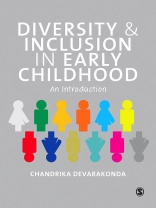Covering a wide range of concepts and taking a broader perspective of what inclusion entail, this book offers an overview of current research, policy and practice in diversity and inclusion in the early years. It is a clear introduction to what inclusive practice means for those working with young children in the early stages of their lives.
With case studies and activities designed to help students relate to diverse situations, the author discusses the main issues surrounding:
– race
– gender
– culture
– disability and Special Educational Needs
– English as an Additional Language
– Traveller children
– the contexts of inclusion and exclusion
– good practice in early childhood settings
– different perspectives of inclusion
This is essential reading for students studying inclusion and diversity on early childhood or early years courses, and those seeking to promote good practice and enable all children to develop to their full potential irrespective of their background.
′The success of this book is in its ability to explore inclusion from a wide perspective. Offering a range of thought-provoking material, such as reflective questions, debates and controversies, practitioner, parent and children′s views, legislation, activities, and examples of good practice, will keep readers interested and actively engaged throughout the book′
-Dr Anna Kilderry, Senior Lecturer, Early Childhood Education, Victoria University, Melbourne, Australia
Chandrika Devarakonda is a Senior Lecturer in the Faculty of Education and Children′s Services at the University of Chester.
Table of Content
Introduction
Gender and Inclusion
Race and Inclusion
Culture and Inclusion
EAL and Inclusion
Gypsy, Roma and Traveller (GRT) Families and Inclusion
Disability and Inclusion
SEN and Inclusion
Conclusion
References
Index
About the author
Chandrika Devarakonda is an Associate Professor in the school of Education at the University of Chester.












